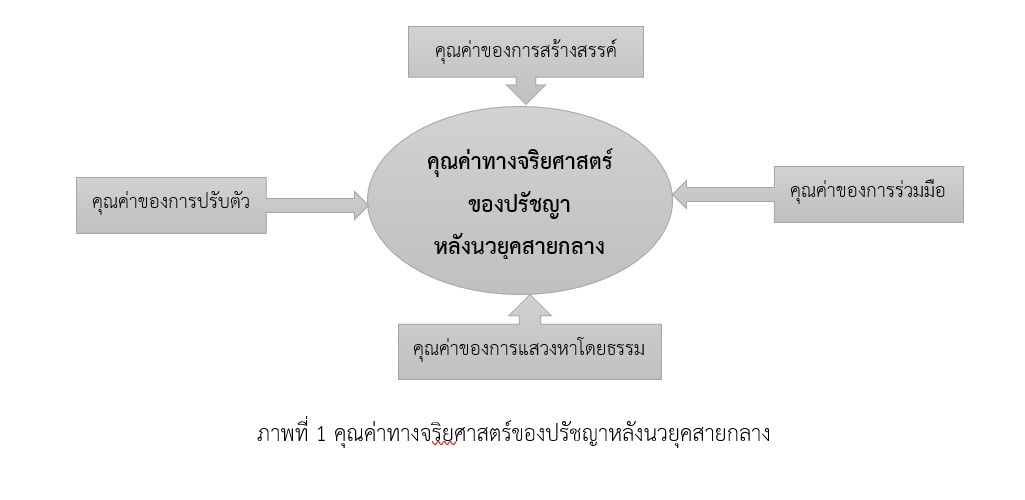An Analytical Study of Ethical Values in Moderate Postmodern Philosophy
Keywords:
Ethics, Moderate Postmodern Philosophy, Ethical ValuesAbstract
This qualitative research aims to analyze documents with the following objectives: 1) To study ethical concepts, 2) To study Moderate Postmodern Philosophy, and 3) To analyze the ethical values of Moderate Postmodern Philosophy. The research findings indicate that: 1) Ethics is defined as the study of behavior, distinguishing between conduct and behavior. Conduct is action without moral guidance, while behavior is guided by morals. Criteria for ethical judgment include judgment based on intention, judgment based on actions. 2) Moderate Postmodern Philosophy is the fifth philosophical paradigm with the goal of developing the quality of life using reason as a method to access reality in terms of the values of life quality. It employs dialogue as a tool for participatory and creative collaboration, embracing diverse opinions and accepting differences. 3) Analysis of the ethical values of Moderate Postmodern Philosophy is divided into four aspects: (1) Value of creativity, (2) Value of Adaptivity, (3) Value of Collaborativity, and (4) Value of Requisitivity. These values, in all four aspects, promote the development of the quality of life both individually and collectively.
References
ชัยโรจน์ นพเฉลิมโรจน์, ดร. (2565). การคิดนวัตกรรมด้วยหลักการทรงงานตามหลักปรัชญาหลังนวยุค. วารสารการวิจัยเพื่อพัฒนาชุมชน (มนุษย์ศาสตร์และสังคมศาสตร์), 15(2), 111-117.
พรชัย บุญปก และบุญร่วม คำเมืองแสน. (2565). เปรียบเทียบจริยศาสตร์ของอิมมานูเอล คานท์ กับพุทธจริยาศาสตร์. วารสารบัณฑิตศาส์น มหาวิทยาลัยมหามกุฏราชวิทยาลัย, 20(1), 182-191.
พระครูกิตติโพธิสาร กิตติปญฺโญ. (2565). การวิเคราะห์พุทธจริยศาสตร์ในประเพณีบุญซัมฮะของตำบลป่าหวายนั่ง อำเภอบ้านฝาง จังหวัดขอนแก่น. วารสารบัณฑิตศึกษามหาจุฬาขอนแก่น, 9(1), 167-180.
พระครูปลัดธันรบ โชติวํโส และคณะ. (2565). ข้อโต้แย้งทางจริยศาสตร์กฎหมายสมรสเท่าเทียม. วารสารสถาบันวิจัยพิมลธรรม, 9(3), 233-247.
พระครูสิริประภัสสรคุณ ปภสฺสโร (ดงมีศรี) และคณะ. (2566). การปลูกฝังจิตอาสาและจิตสำนึกในองค์กรทางคุณธรรมจริยธรรมในสังคม. Journal of Modern Learning Development, 8(7), 383-396.
พระอนุลักษ์ ฐิตวฑฺฒโน (สุขเรือง). (2566). แนวทางการปฏิบัติตามหลักพุทธจริยธรรม. วารสารพุทธนวัตกรรมและการจัดการ, 6(3), 195-206.
ภูดิส ศิสิตศิชศักดิ์. (2565). การศึกษาเชิงวิเคราะห์บทบาทของความรู้สึกในทฤษฎีจริยศาสตร์ของคาร์ล่า แบกโนลี. วารสาร มจร ปรัชญาปริทรรศน์, 5(1), 14-24.
เมธา หริมเทพาธิป. (2563). การจูงใจตนเองในแนวทางหลังนวยุค. วารสารพุทธมัคค์, 5(1), 99-107.
________. (2561). การมีส่วนร่วมในมุมมองหลังนวยุค. รมยสาร, 16(3), 63-76.
ศุภมา จิตต์เที่ยง และคณะ. (2566). แนวทางการนำหลักพุทธจริยธรรมมาใช้พัฒนาผู้นำทางการเมือง. วารสารพุทธนวัตกรรมและการจัดการ, 6(6), 227-237.

Downloads
Published
How to Cite
Issue
Section
License

This work is licensed under a Creative Commons Attribution-NonCommercial-NoDerivatives 4.0 International License.



